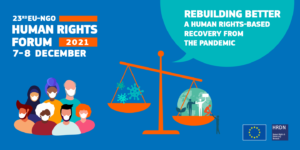Economic, social and labour rights were the thematic headlines of this year’s EU-NGO Human Rights Forum, where three Dalit human rights defenders were featured as panellists, facilitated by IDSN. Caste-related barriers to healthcare in Pakistan, post-covid economic and social recovery for Dalit workers in South Asia and building corporate accountability to respect human rights were among the key topics covered by the panellists.

Speaking on the panel on barriers to universal healthcare, Pirbhu Satyani, of the Pakistan Dalit Solidarity Network, called on the EU to act on caste and religious based discrimination in Pakistan and strictly monitor the progress on financial transparency, anti-discrimination practices, equal opportunity, inclusion and democratic space for civil society and NGOs under the GSP+ agreement.
Mr. Satyani furthermore called for action to ensure that sanitation workers, many of which are Dalits and Christian minorities, have access to regular health screening, provision of safety kits, health insurance, social security and financial compensation to address risks involved in their work.
Dalit rights defender and researcher, Samarpana Ramesh, spoke on the panel on promoting and implementing economic and social rights in the post-COVID recovery. She stressed the need for recovery efforts in relation to Dalit workers who lost their work and livelihoods as a result of Covid-19 lockdowns and effects.
Ms. Ramesh also called for EU corporations to implement measures to prevent and remedy caste- and gender discrimination in supply chains in South Asia. Such measures could also include supporting Dalit women workers in factories to get organised into unions and supporting Dalit human rights defenders.
Similar issues were raised by Raman Karuppusamy, Founder of the Rights Education And Development Centre (READ), speaking on the panel on corporate accountability. He explained to participants how poverty, gender and caste intersect as root causes of worker exploitation in the textile sector in India.
Mr. Karrupusamy furthermore called for a multi-stakeholder approach in addressing caste related human rights abuses and ensuring corporate accountability. He also urged Governments to step up action to ensure the implementation and improvement of national education schemes to build better futures for caste affected communities.
IDSN took part in many sessions at the forum from the 7-8 December, learning and sharing with participants to start building back better.
The recordings of the sessions are available online.
Key IDSN tweets from the Forum:
Delighted that @READSathy spoke at #EUNGOForum2021 on the need to address increasing #childLabour issues as a result of pandemic. #Dalit #Children disproportionately affected @ILO_Childlabour @endchildslavery
— International Dalit Solidarity Network (IDSN) (@idsnupdates) December 7, 2021
Speaking today @PirbhuSatyani on the need to ensure #access to #Health for all with focus on #dalits #minorities in #Pakistan @EamonGilmore #EUNGOForum2021
— International Dalit Solidarity Network (IDSN) (@idsnupdates) December 8, 2021
Speaking now on the need to ensure social protection for all workers inc #dalits #minorities samarpana #EUNGOForum2021 @ILO_EndSlavery
— International Dalit Solidarity Network (IDSN) (@idsnupdates) December 8, 2021
#Endcastediscrimination #GenderBasedViolence in supply chains. Worse since #COVID19 #EUNGOForum2021 @ethicaltrade business also have a responsibility. Wise words from panel
— International Dalit Solidarity Network (IDSN) (@idsnupdates) December 8, 2021
Time to also focus on #healthcare of #sanitationworkers. Too much apathy from #Pakistan @PirbhuSatyani tells @sewperheroes #EUNGOForum2021 @asifaqeel @maryjamesgill
— International Dalit Solidarity Network (IDSN) (@idsnupdates) December 8, 2021
Time to also focus on #healthcare of #sanitationworkers. Too much apathy from #Pakistan @PirbhuSatyani tells @sewperheroes #EUNGOForum2021 @asifaqeel @maryjamesgill
— International Dalit Solidarity Network (IDSN) (@idsnupdates) December 8, 2021
#EUNGOForum2021 key issues being raised now on issues #GenderBasedViolence #childlabour. Workers of #oppressed caste are rarely paid even #minimumwage despite legislation. @ethicaltrade
— International Dalit Solidarity Network (IDSN) (@idsnupdates) December 8, 2021
